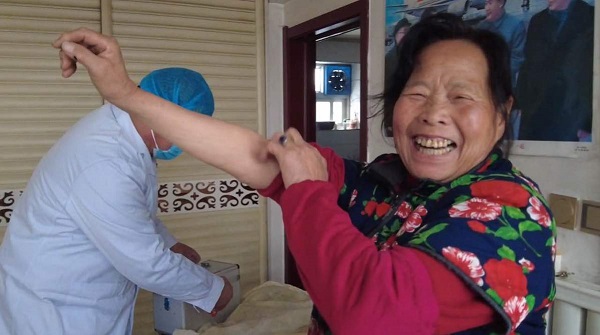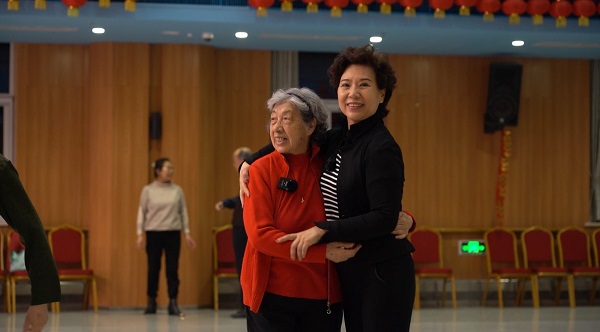People at grassroots express hopes for top meetings

Gao Jie, left, pays an out-patient visit to check a villager's blood pressures at her home. [Photo by Yin Weihao/chinadaily.com.cn]
It was a chilly and snowy morning in early February, and worried that villagers suffering from high blood pressure might lose their balance and slip in the snow, Gao Jie, the only physician in the village of Tongchuan in Hebei province, started his busy workday with home visits and health checks.
About a three-hour drive from Beijing, the village has been relying on Gao's steady service for 24 years.
Ahead of the two sessions in early March — the meetings of top legislature and top political advisory body — China Daily reached out to ordinary people like Gao in different sectors of society to hear what they expect from the top-level meetings.
Gao's daily health check service aims to cover as many villagers as possible, since most of them still refuse to see a doctor unless obvious symptoms start to develop.
Many young people in rural areas are seeking better career opportunities in cities, so it might be difficult to find someone willing to take over from him in his retirement, said Gao, 50.
Asked what he expected from the two sessions, Gao said he would like to see preferential healthcare policies that would help rural areas win back young talent from cities.
"It would be nice if my fellow villagers can get taken care of at our clinic, instead of going to faraway cities for medical service," said Gao.
Feng Xiaotao is one example of a young person going against the prevailing trend of heading to major cities. He returned to his hometown of Miaowa, a village in Luoning county, Henan province, to take over running an orchard from his father.
Feng has big ideas and big plans for the orchard, and he wishes to reach out to as many customers as possible, way beyond the number that could be reached through the traditional and small-scale agricultural business model pursued by his father.
With help from the local government, he set up a cooperative that over 20 local households have signed up for so far. The cooperative provides a wide range of support to its members, including purchases of agricultural goods and expanding online sales.

Feng Xiaotao shows a fresh apple produced at his orchard. [Photo by Chen Xinyu/chinadaily.com.cn]
Feng, who regards himself as a "new farmer" connecting technology and trends, said he wants to see greater publicity given to preferential policies related to the employment of young people in rural areas.
Meanwhile, in Zhejiang province, the nation's export and import hub, people are also thinking about how they can expand their business opportunities, by winning more orders in the global marketplace.
Those sentiments echo the findings of a recent survey conducted by China Daily and its 10 global media partners, showing that economic topics are receiving worldwide attention in the run-up to the two sessions.
More than 20 percent of the survey's around 8,000 respondents chose GDP growth as their most-watched China-related topic, followed by trade.
As the world keeps its focus on the second-largest economy's post-pandemic performance, Zhejiang has started warming up for what looks like a robust year for business.
This confident outlook is reflected by the round-the-clock operations at Yanwen Express, a Hangzhou-based company that helps importers and exporters with cross-border logistics.
Cong Zheming, the company's manager, said it processes millions of courier receipts every day.
Since the Chinese New Year holiday, the company has been handling 30 percent more cargo than at the end of last year, Cong added, pointing out that the rising volume of cargo being handled by the company is an indication of the increasing optimism of many of its customers.
Cong said he hoped to see pro-business policies unveiled at the two sessions.
"I hope the government can introduce policies that take the corporate sector's needs into account so that everyone can proceed with their business planning with confidence," said Cong.
Spring is also a busy season for college graduates. An offline job fair, the first of its kind in Beijing after the pandemic, offered more than 3,000 vacancies in early February.
Li Zixuan, who is trying to secure a human resources position, said she had to think about more than just a job in order to have a decent life in a megacity like Beijing.
As one of the millions of college graduates diving into the competitive job market, Li, a postgraduate student at China University of Mining and Technology, said she would welcome policies such as housing subsidies that would help make the life of newcomers a bit easier in the nation's big cities.
While some people are eager to live in Beijing, others are moving out, such as 87-year-old Ye Shounan, who left the city he had been living in for decades to move to an affordable nursing home in Sanhe, a city in neighboring Hebei province.

Retirees stay at a nursing home, operated by Yanda International Health City. [Photo by Zheng Chenxiao/chinadaily.com.cn]
The nursing home, operated by Yanda International Health City, is a trial project aimed at serving retirees in Beijing, Tianjin and Hebei.
While Ye and his peers said they were satisfied with the daily care and medical services offered at the nursing home, Li Haiyan, Yanda's vice-president, said the country's wellness industry, which is still in its early stages, is not yet ready for a rapidly aging society.
To provide better service to elderly people, Li said there should be policies to help increase the number of skilled care workers.
- Top legislature schedules standing committee session for late February
- China's top legislator meets with Uruguayan president
- Senior legislator surveys Anhui on formulating outline of provincial 15th Five-Year Plan
- China's top legislator meets with British PM
- NPC deputies see more engagement with top court



